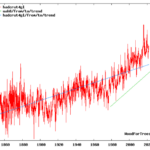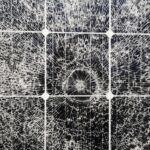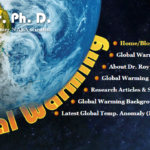
Eerder heb ik reeds gewezen op het werk van prof. Valentina Zharkova en haar team van de Universiteit van Northumbria naar aanleiding van een persbericht van de de ‘Royal Astronomical Society’.
A new model of the Sun’s solar cycle is producing unprecedentedly accurate predictions of irregularities within the Sun’s 11-year heartbeat. The model draws on dynamo effects in two layers of the Sun, one close to the surface and one deep within its convection zone. Predictions from the model suggest that solar activity will fall by 60 per cent during the 2030s to conditions last seen during the ‘mini ice age’ that began in 1645. Results will be presented today by Prof Valentina Zharkova at the National Astronomy Meeting in Llandudno. …
Maar dat is natuurlijk strijdig met de menselijke broeikashypothese (AGW = ‘Anthropogenic Global Warming’), die de opwarming (die al zo’n twintig jaar op zich laat wachten) vooral toeschrijft aan de menselijke uitstoot van CO2 door verbranding van fossiele brandstoffen. Maar volgens het hedendaagse Lysenkoïsme mogen dit soort berichten niet worden verspreid.
Onder de titel, ‘Global Warming Extremists Try To Silence Science — Again’, rapporteerde ‘Investor’s Business Daily’ daarover onlangs het volgende:
Recent studies suggest that the sun is in a cooling phase, which might lead to cooling on Earth. But such studies have met with bitter opposition from global warming proponents, who see them as a threat to their lucrative orthodoxy.
Climate Change: Global warming advocates like to pretend they are open-minded, all about science. But let someone else’s science get in the way of their “consensus,” and you find out how little they really believe in science.
Just ask Professor Valentina Zharkova of Britain’s Northumbria University. She and a team of researchers conducted a study on sunspots, which are known to have a strong effect on solar radiation and thus on the Earth’s climate.
What they found was remarkable: solar activity, based on models that closely fit past trends, looks to be headed for a sharp downward turn. Indeed, activity could decline to levels not seen since the so-called “Little Ice Age,” an unusually cold period that stretched across the Northern Hemisphere and lasted from roughly 1650 to 1850.
As such, a study of this kind, you might think, would be incredibly important. But instead of being greeted with scientific questions or open curiosity about her group’s study, Zharkova’s team was met with a most unscientific hostility.
“Some of them were welcoming and discussing,” she said in an interview with The Global Warming Policy Forum. “But some of them were quite — I would say — pushy.”
And some went well beyond just “pushy.”
“They were trying to actually silence us,” said Zharkova. “Some of them contacted the Royal Astronomical Society, demanding, behind our back, that they withdraw our news release.” …
For the record, Zharkova isn’t alone in her conclusions. Other recent studies, including ones found here and here, suggest the Sun is headed for a period of extremely low activity — which means, all other things being equal, lower temperatures for much of the Earth.
No, the problem isn’t the science. The problem is such research is an uncomfortable impediment of the global warming complex’s unholy alliance of green interest groups, clueless movie stars, bought-and-paid-for scientists, big government politicians, and even some major corporations that see new global warming regulations as an easy way to crush their smaller competitors.
With global governments spending billions of dollars a year on climate change, almost all of it on those who believe the global warming dogma, there’s too much at stake to allow a heretic to question the orthodoxy. That’s why Zharkova and others are greeted with unscientific hostility. …
Aldus Investor’s Business Daily.
Lees verder hier.
Tja, zo gaan die dingen. De opwarmingshysterie mag niet door twijfel als gevolg van nieuwe wetenschappelijke inzichten worden ondermijnd.
Voor mijn eerdere bijdragen over klimaat en aanverwante zaken zie hier, hier, hier, hier en hier.






Het probleem is natuurlijk niet dat er voorspeld wordt dat de zon minder actief wordt, het probleem is dat de conclusie “er komt een kleine ijstijd aan” er mee verbonden wordt.
Dat blijkt nl. niet uit het ONDERZOEK wat Prof Valentina Zharkova gepubliceerd heeft.
En natuurlijk heeft de zon invloed op het klimaat, maar de correlatie tussen zon en T is al jaren zoek aangezien de zon al sinds 1955 in een dalende fase zit en de huidige opwarming sinds 1975 zonder enige pauze aan het doorzetten is.
JvdH
Als je leugens begint te vertellen is je reactie niet waard om op te reageren.
De hiatus is er wel
http://www.volkskrant.nl/wetenschap/de-opwarming-van-de-aarde-hapert-voor-even~a3722767/
En alle verklaringen die vervolgens door de warmste gegeven worden berusten op speculatie.
Ook het feit dat vervolgens na 2014 de hiatus steeds meer ontkend wordt.
Met andere woorden blijf weg met je onzin. Heb je echt wat te brengen dan horen we het wel weer.
Wat een botte reactie weer op JvdHeijden. En wat een eindeloze welles-nietes discussie over wel of geen hiatus. Krijgen we daar dan nooit genoeg van? Het ligt er maar aan waar je naar kijkt en met welke statistiek. Kijken we naar de gemiddelden over een groter aantal jaren (bijvoorbeeld 15 jaar) dan is er een voortgaande opwarming te zien. Kijken we naar de temperatuur van het zeewater (SST) dan is er ook een voortgaande opwarming te zien. Ook de globale temperatuurrecords (met dank aan El Nino) duiden op een voortgaande opwarming.
Zharkova voorspelt dat de activiteit van de zon gaat teruglopen tot het niveau tijdens het Maunder Minimum (‘kleine ijstijd’). Maar 4 eeuwen geleden was er geen AGW.
Lees maar eens na wat prof. C.de Jager er over geschreven heeft:
http://www.cdejager.com/wp-content/uploads/2013/10/2013-CdeJ-HN-Sun-climate-NS-5-1112.pdf
De verminderde activiteit is hooguit in staat om de opwarming af te remmen.
Het gaat om activisten die afwijkende opvattingen willen verbieden.
De klimaatwetenschap is er beslist nog niet uit, onzekerheden te over.
Het merkwaardige is dat dezelfde activisten weigeren in te zien dat “hernieuwbaar” zonder zinnige opslag geen oplossing is voor een bestendige energievoorziening.
Juist klimaatwetenschappers zouden aan de orde moeten stellen dat AGW niet bestreden kan worden met “hernieuwbaar”.
Hugo,
“Ook het feit dat vervolgens na 2014 de hiatus steeds meer ontkend wordt”
Inderdaad de “hiatus” is voorbij, over. Het was een pauze en bij mij betekend pauze dat het daarna verder gaat.
Tenminste als ik in het theater ben gaat de voorstelling verder na de pauze. Maar misschien is dat voor jou altijd een verrassing?
http://www.woodfortrees.org/plot/gistemp/from:1968/to:1998/trend/plot/gistemp/from:1978/to:2008/trend/plot/gistemp/from:1986/trend/plot/gistemp/from:1968/mean:12
Waar zie jij de Pauze?
“Als je leugens begint te vertellen”
Stop daar zelf dan ook eens mee en onderbouw je mening voortaan met feiten / wetenschappelijk onderzoek, er zal een wereld voor je open gaa.
Onbegrijpelijk dat die geschiedenis leraar hier nog steeds zijn verhaaltjes mag publiceren.
JvdH je reactie van 10.21
“Inderdaad de “hiatus” is voorbij, over. Het was een pauze en bij mij betekend pauze dat het daarna verder gaat.”
en om 8.15:
en de huidige opwarming sinds 1975 zonder enige pauze aan het doorzetten is.
En dat beste JvdH heet liegen of manipuleren of gewoon de discussie saboteren.
Bart het zal wel duidelijk zijn denk ik.
Hugo Matthijsen,
als je gaat kijken vanaf 1998 dan lijkt (en het tover woord is lijken) het dat het minder snel opwarmt, dat valt allemaal onder natuurlijke variatie, je zou het “pauze”of hiatus kunnen noemen. Als je kijkt naar een periode van 30 jaar dan is die “pauze”niet meer te zien.
Het is moeilijk, maar als je wat meer tijd had gestoken in wetenschap en minder in het schrijven van opinie stukjes had je dat kunnen weten
Janos,
waar zie jij de opwarming?
http://www.woodfortrees.org/plot/rss/mean:12/plot/rss/mean:12/to:1998/trend/plot/rss/mean:12/from:1998/trend
Het is natuurlijk een beetje suf om naar 30 jaar te kijken en een trendlijn te zetten als de argumentatie is dat de temperatuur over de afgelopen 20 niet noemenswaardig is gestegen. Natuurlijk is er dan een stijging te zien.. #koekoek
Erik,
Zie je die 0,2c opwarming in 1998?
Maar nu wil jij natuurlijk zeggen dat dat El Nino is, maar dan moet jij even verklaren hoe een El Nino voor een step change in temperatuur kan zorgen.
Maar daar zal wel weer geen antwoord op komen
Janos,
Maar nu wil jij natuurlijk zeggen dat dat El Nino is, maar dan moet jij even verklaren hoe een El Nino voor een step change in temperatuur kan zorgen.
Het hele verschijnsel El Niño is een soort van step change. Wat wil je nou zeggen?
Nee de El Nino van 1997/98 is voor jouw de verklaring van de step change, maar een wetenschappelijke onderbouwing hoe wat er waarom ontbreekt natuurlijk volledig.
Denk eens na en kom met een verklaring, houdt in het oog dat
OHC blijft stijgen, de wet behoud van energie en natuurlijk Stefan Bolzman
https://en.wikipedia.org/wiki/Stefan%E2%80%93Boltzmann_law
jvdh
waarom moet ik komen met een verklaring voor de ‘step change’ ?
Ik neem waar, en dat is voorlopig voldoende, als je een verklaring wil dan zoek je die zelf maar.
Maar bedenk vooral, als jij geen verklaring van een verschijnsel kent is dat absoluut geen bewijs dat dat verschijnsel niet bestaat.
Jij weet alleen geen verklaring, nou en?
Erik,
durf na te denken zou ik zeggen
1. de uitstraling naar het heelal neemt toe met T^4, dit is tevens de grootste negatieve feedback in het klimaat systeem. ie. door de El Nino neemt dus op een of andere manier de uitstraling van energie duurzaam toe.
2. Bij een el nino komt energie uit de oceanen. je ziet dan ook dat OHC minder toeneemt bij een El Nino, maar dat daarna de toename weer doorgaat, aangezien OHC sinds 1997/98 flibk is toegenomen komt de energie dus niet uit de oceanen.
Jouw waarneming is dus in strijd met de weten behoud van energie. Had je je een klein beetje in het klimaat verdiept dan had je dat geweten.
Wat ik het erge vind is dat je al jaren volhoud dat er een step change is , en zeker weet dat jouw step change de goede weergave is van het systeem maar
1. weigert een verklaring te zoeken
2. weigert een andere verklaring in overweging te nemen.
Wat betreft het verband tussen de zonnevlekken en klimaat, daar verandert geen sterveling iets aan. Geen oeverloos gezwam maar gewoon afwachten en berusten.
Inderdaad afwachten en berusten, dat is pas wetenschap!
/sarc
Dat het waarnemen en is onderdeel van echte wetenschap. In tegenstelling tot modelleren wat onder waarzeggerij valt. Maar overgoten met en wetenschappelijk sausje wordt het niet meer als zodanig herkend.
Correctie: “dat het waarnemen” moet “dat heet waarnemen” zijn
N. Pronk,
dat CO2 zorgt voor opwarming is ook waarnemen (iets waar de meeste “sceptici”hun ogen voor sluiten), dat warmer meer verdamping betekend is ook waarnemen, dat warmer betekend dat ijs smelt en er minder energie wordt terug gekaatst is ook waarnemen, dat warmer betekend dat lucht meer waterdamp kan bevatten is ook waarnemen.
Dat je dat vervolgens in een model gooit is een model gebaseerd op waarnemingen (maar dat willen “sceptici” dan vervolgens niet meer weten)
@Janos:
“dat CO2 zorgt voor opwarming is ook waarnemen”
Niet echt, je meet het CO2-gehalte en je meet de temperatuur.
Dan ga je middelen ad infinitum.
Een hypothese legt verband tussen die twee gemiddelden.
Zolang èn CO2 èn de temperatuur niet op dezelfde locatie en op dezelfde tijd wordt gemeten blijft het rommelig.
jvdh
dat CO2 zorgt voor opwarming is ook waarnemen (iets waar de meeste “sceptici”hun ogen voor sluiten),
CO2 neemt toe, temperatuur neemt toe. Dat is nog geen bewijs dat ze iets met elkaar te maken hebben.
Je hebt nog nooit een reactie gegeven hoe het kan dat 1 molecuul CO2 1 miljoen luchtmoleculen meetbaar opwarmt.
Behalve de almachtige zijn er weinigen die de hoeveelheid zonnevlekken kunnen beinvloeden. Devies is rustig afwachten.
En alleen mensen kunnen het CO2 nivo aanpassen, daar kan de almachtige vrij weinig aan doen
Devies is natuurwetten proberen te begrijpen
Maar of Janos natuurwetten begrijpt?
Bijna elke dag reis ik met de tram naar de UBA (Spui) en een tijdje later weer naar huis. In een Amsterdamse tram kan je heel goed allerlei mensen “interviewen”. Door zulke gesprekken heb ik geleerd onderscheid te maken tussen mensen met gezond verstand , waarvan een scherpe intuïtie deel uit maakt, en niet kritische mensen die in vele gevallen nog naar journaals en praatprogramma’s op de TV kijken en waardeloze c.q. leugenachtige kranten lezen, vaak een HBO-opleiding hebben of universitair geschoold zijn, soms zelf docent aan de UVA. De eerste groep heeft een antenne voor leugens en bedrog en voelt zich sowieso belazerd, niet in het minst door politici en op de TV kakelende “deskundigen”, is ook onmiddellijk bereid aan te geven dat het in al dat klimaatgedoe om geld gaat, de tweede groep is met opleiding en al min of meer wereldvreemd, naïef en slikt in meerderheid de opwarmingsverhalen en daarmee verbonden bedreigingen als zoete koek. De intellectuelen in Nederlanden vertonen een hoog nepgehalte.
Hoe komt het dat ook de meeste studenten die ik al of niet in de tram spreek een alarmerend gebrek aan kennis en inzicht tonen wanneer het klimaat aan de orde wordt gesteld? Al op de basisschool wordt de klimaatonzin erin geramd. Mijn waarneming laat het resultaat zien van deze indoctrinatie. Afschaffen die hele onderwijszooi. Beperk onderwijs tot rekenen, schrijven, lezen, geschiedenis en aardrijkskunde. Geen gepraat over evolutie, religie, klimaat enz. Het onderwijzend personeel is daarvoor niet toegerust, in duidelijk Nederlands uitgedrukt: te achterlijk en geborneerd. Het zelfde geldt in het kwadraat voor sociale academies en faculteiten, journalistenopleidingen e.d. Daar komt met name het “intellectuele” schorriemorrie vandaan, dat het maatschappelijke klimaat vervuilt en verpest. Dat is ons grootste klimaatprobleem.
@Cornelis van den Berg:
Helaas, hoe waar!
Vanmiddag een HBO’er elektrotechniek moeten uitleggen (met rollen biscuitjes) dat de slogan “het waait overal wel ergens” invloed heeft op het op te stellen vermogen van windturbines als men een bestendige energievoorziening nastreeft.
Dunning Kruger in actie
Ik ben universitair geschoold, maar ik heb wel degelijk een neus voor leugens en regelrechte (klimaat)propaganda. Al bij de eerste claims van Al Gore doorzag ik de klimaatleugen al, want meneer Gore kreeg een politieke prijs (Nobelprijs van de Vrede) en niet een prijs gebaseerd op wetenschappelijk onderzoek (Nobelprijs Natuurkunde, Geneeskunde om maar even iets te noemen). Bovendien werden de critici meteen weggezet, zoals zij dit ook deed met Alfred Wegener en Gandrashekhar. Maar die heeft wel zijn Nobelprijs voor de Natuurkunde gekregen (!). Wie ogen heeft, die moet ook eens leren zien.
Is in augustus gestegen ijs mate in het Noordpoolgebied Central?
ftp://sidads.colorado.edu/DATASETS/NOAA/G02186/plots/4km/r11_Central_Arctic_ts_4km.png
Ren, hoe zit het met het totaal aan zeeijs?
Erik
https://nsidc.org/data/masie/masie_plots.html
“Vocht laiden luchtpakket stijgt, koelt bij droge adiabatische lapse rate (~ 1oC / 100m) tot aan het dauwpunt, op welk punt er condensatie optreedt bereikt. Daarna verdere stijging veroorzaakt afkoeling tot de vochtige adiabatische snelheid (0,5 – 0.9oC / 100), vanwege de vrijkomende latente warmte.”
http://www.ldeo.columbia.edu/~martins/climate_water/slides/lapse_rate.gif
Sun’s magnetisch veld.
http://wso.stanford.edu/gifs/Polar.gif
Het is opmerkelijk hoe Heijden steeds meer afglijdt naar ontkenninG / DENIAL!
Oh… ja… v.d. Heijden en de nutteloze bijdragen. Zoals de obscurantist is vertrouwt hij zijn medemens.
Peter Piek,
Ik kijk sceptisch naar de bijdragen van iedereen, als de wetenschappelijke publicatie het blog bevestigd dan hebben ze keurig hun mening onderbouwt, als de opinie is gebaseerd op een andere opinie en die niet overeenkomt met de wetenschappelijke publicatie vraag ik maar weer eens om meer onderbouwing.
Dus Peter welke wetenschappelijke publicatie ligt onder dit blog?
welke wetenschappelijke publicatie heb je zelf ooit geschreven? Of ben je een droogzwemmer cq. beste stuurman aan wal?
Wim,
Schrijf ik stukjes die iets beweren wat niet onderbouwd wordt door eeen wetenschappelijke publicatie?
Hans schrijft al 10 jaar dat een kleine ijstijd nu echt binnenkort gaat komen, en iedere keer wordt zijn mening niet onderbouwd door de publicatie waar hij zijn stukje op schijnt te baseren.
Maar weinig mensen begrijpen dat zonne-activiteit een sterke invloed op de polaire vortex.
http://www.cpc.ncep.noaa.gov/products/stratosphere/strat-trop/gif_files/time_pres_WAVE1_MEAN_JAS_SH_2016.png
http://www.cpc.ncep.noaa.gov/products/stratosphere/strat-trop/gif_files/time_pres_HGT_ANOM_JAS_SH_2016.png
http://www.cpc.ncep.noaa.gov/products/stratosphere/strat-trop/gif_files/time_pres_TEMP_MEAN_JAS_SH_2016.png
Abstract
Lidar measurements of atmospheric temperature profiles and aerosol backscatter ratio and depolarization have been carried out at Thule (76.5°N, 68.8°E), Greenland, in the period January – early March 2009. The Lidar, installed at Thule in 1990, is part of the Network for the Detection of Atmospheric Composition Change (NDACC). During winter 2008-2009, Lidar profiles were acquired on a regular basis with a maximum of 5-6 hours of measurements per day, except for a few periods characterized by poor weather conditions or instrumental problems. A total of 44 Lidar temperature profiles between 25 and 70 km were obtained during the measurement campaign. Radiosonde data obtained at the stations of Eureka (79.9°N, 85.9°W) and Alert (82.5°N, 62.3°W) were used to derive temperatures below 25 km. Lidar temperature profiles have permitted to show the evolution of the stratospheric thermal conditions. During the first part of the campaign, in mid-January 2009, the polar vortex was still present above Thule. A polar stratospheric cloud (PSC) of NAT particles was detected on January 17 and 18 between 17 and 19 km. The major sudden stratospheric warming (SSW) was observed during the second half of January. The warming affected the upper stratosphere (~ 40-45 km) first, and then propagated rapidly from the upper to the lower stratosphere. The temporal evolution of the stratospheric temperature was derived at fixed potential temperature levels between 500 and 1500 K. Lidar data show the first signs of the warming at the 1500 K level (~ 42 km) on 22 January, after a week of instrumental problems that prevented from carrying out measurements. After 2-3 days, the warming reached 1000 K (~ 34 km), 900 K (~ 32 km) and 800 K (~ 29 km), and after 5-6 days it reached 600 K (~ 23 km) and 500 K (~ 20 km). Comparison of Lidar data with CIRA model profiles indicates that during the SSW the measured temperature between 25 and 45 km altitude exceeded by 40-50 K the expected CIRA values, reaching a maximum of ~290 K at 40 km. The intensity peak of the SSW was observed between 22 and 24 January. The warming produced an abrupt and irreversible break of the polar vortex. Comparison of 2009 data with Lidar atmospheric temperature measurements obtained during several years between 1994 and 2007 indicates that the 2009 SSW was the strongest event ever observed by the Lidar at Thule.
http://adsabs.harvard.edu/abs/2009AGUFM.A21C0202D
Polaire vortex formatie op Zuidpool 1 januari 2014 tot en met juli 2014 (27 km).
https://www.youtube.com/watch?v=vgLPN-wTGdM
https://earth.nullschool.net/#current/wind/isobaric/10hPa/orthographic=-202.66,-61.17,300
Wat is een polaire vortex? Wat onderscheidt het?
De polaire vortex, als het klinkt, is het verkeer van sterke, upper-level winden die normaal gesproken rond de noordelijke veld in een richting tegen de klok – een polar low-druksysteem. Deze winden hebben de neiging om de bittere koude lucht opgesloten in de arctische gebieden van het noordelijk halfrond te houden. Het is niet een storm. Bij gelegenheid, kan deze vortex vervormd worden en dompel veel zuidelijker dan je normaal zou vinden, waardoor koude lucht naar het zuiden te morsen.
Foto’s: De winter weer grepen de VS Foto’s: De winter weer grepen de VS
Hoe vaak is deze polaire vortex vervorming voordoen?
“Het bovenste niveau winden die deel uitmaken van de polaire vortex verandering in intensiteit van tijd tot tijd. Als die wind aanzienlijk dalen, kan het toestaan dat de vortex vervormd raken, en het resultaat is een straalstroom die diep stort in zuidelijke breedtegraden, waardoor de koude, dichte Arctische lucht morsen naar beneden mee. Deze oscillatie staat bekend als de Arctische Oscillatie en kan overschakelen van een positieve fase negatief fase enkele malen per jaar. Deze oscillatie – namelijk de negatieve fase waarin de polaire wind zwakker zijn – de neiging om te leiden tot grote koude lucht Uitbraken in één of meer regio’s van de planeet.”
https://www.youtube.com/watch?v=Bc4VC23ABVA
Het enige dat Mevrouw Zharkova doet is een cyclus vaststellen met grote waarschijnlijkheid die doet vermoeden dat dat er een nieuwe Kleine IJstijd op komst zou kunnen zijn, als de hypothese correct is. Deze hypothese zal nog wel een poosje op bevestiging/weerlegging moeten wachten. Dit is alles. God, god wat een commotie hebben we weer. De bekende protagonisten weer hoog in de gordijnen. Alarmisten in de 112-modus van ontkenning. Gillende sirenes en dichtsmakkende deuren. Wat een treurige vertoning van zelfoverschatting.
“Het enige dat Mevrouw Zharkova doet is een cyclus vaststellen met grote waarschijnlijkheid die doet vermoeden dat dat er een nieuwe Kleine IJstijd op komst zou kunnen zijn, als de hypothese correct is”
Je lijkt het nog steeds niet begrepen te hebben, Jeroen. Mevrouw Zharkova voorspelt dat de zon minder actief wordt. Ze is astrofysica of zoiets, geen klimaatdeskundige. Hoe het gaat uitpakken hangt ook van andere factoren af, zoals het oplopende broeikaseffect. Er lijkt ook verwarring te zijn over de mate van de vermindering. Het aantal zonnevlekken gaat sterk afnemen als de voorspelling uitkomt, maar de totale hoeveelheid zonlicht maar met een fractie van een procent.
Jeroen schrijft:
“…doet vermoeden…”, “…zou kunnen zijn…”, “als de hypothese correct is..”
Ik zou echt niet weten hoe je het nog voorzichtiger kunt formuleren . Wat is nou eigenlijk je probleem, Bart?
Jeroen,
Laat even zien in welk onderzoek mevrouw Zharkova een kleine ijstijd voorspeld. Dus niet alleen een lagere zonneactiviteit, maarook een lagere temperatuur
Dus hup aan het werk, onderzoek ( dus geen press release) lezen en daarna even een linkje posten.
jvdh
je mag ook zelf nadenken. Wanneer deze mevrouw soortgelijke zonneverschijnselen schetst als in de kleine ijstijd aanwezig waren, is het verstandig, als voorzorg, een (potentieel) dergelijk gevolg te onderzoeken.
Overigens geloof ik zelf in een hervatting van de opwarming na de pauze, zo circa 2030. Maar niet door CO2.
“je mag ook zelf nadenken.”
Inderdaad dat mag en dat heb ik natuurlijk ook gedaan.
1. Als mevrouw Zharakova een forse afkoeling (1C globaal) verwacht had dat in haar onderzoek gestaan
2. Onderzoeken naar de effecten van een Maunder minimum geven een afkoeling van 0,1-0,2C aan.
Dus durf zelf na te denken Erik!
De reacties onder dit artikel zouden net zo goed onder welke andere posting op Climategate kunnen staan. Bijna alles is off topic: “Het gaat om activisten die afwijkende opvattingen willen verbieden.”